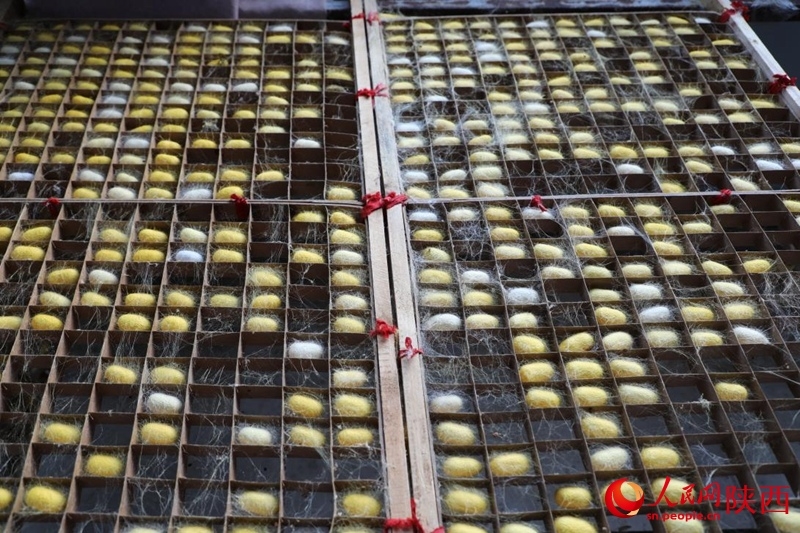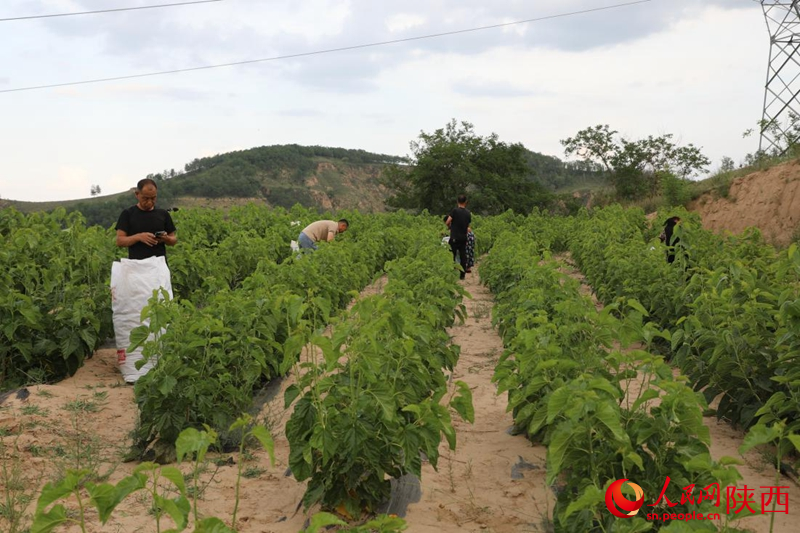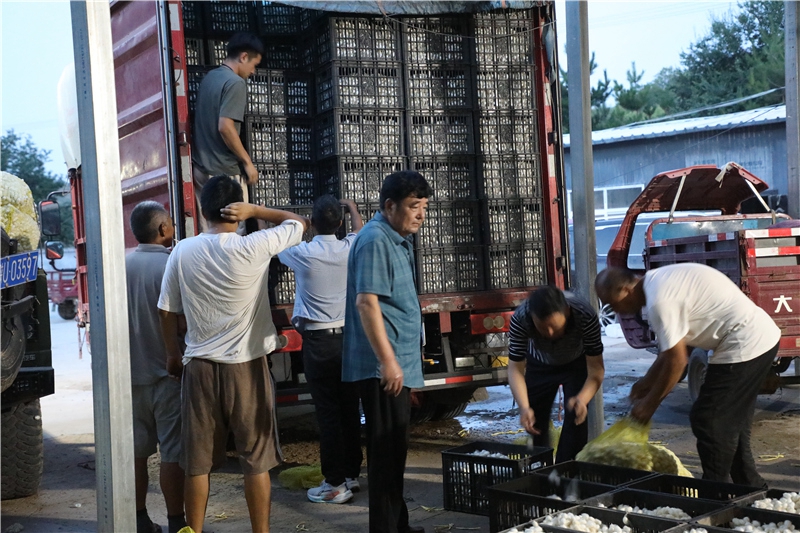Silkworm farming brings prosperity to county in NW China's Shaanxi
2025-08-05 11:13:30 来源:人民网 
2025-08-05 11:13:30 来源:人民网 
Under the scorching summer sun, a silkworm cocoon collection site in Yanchuan county, Yan'an city, northwest China's Shaanxi Province, bustles with activity as farmers celebrate a successful season.
"68 yuan (about $9.47) per kilogram! This year's cocoons are of exceptional quality with even higher prices," said Xiao Ganliang, a buyer from east China's Jiangsu Province, his words sparking jubilant smiles among local silkworm farmers.

Photo shows silkworm cocoons in Wangjiagou village of Guanzhuang town in Yanchuan county, Yan'an city, northwest China's Shaanxi Province. (People's Daily Online/Li Zhiqiang)
"Our mulberry leaves are of superior quality, with protein, fat, and soluble sugar content exceeding that of southern regions. The temperature conditions in our cave dwellings prove ideal for raising large silkworms," said an official from the county's bureau of agriculture and rural affairs.
The thriving development of the silkworm industry in the county, located on the Loess Plateau, is inseparable from solid industrial foundations, robust policy support, and innovative development approaches.
Between 2018 and 2021, Yanchuan county launched a pilot project for mulberry cultivation and silkworm rearing in Yangjiaping village, Guanzhuang town, achieving remarkable results that laid the groundwork for expansion.
Building on this success, the county launched the comprehensive development of the silkworm industry in 2022. It issued a specialized implementation plan to support the development of sericulture in economically disadvantaged villages, introducing preferential policies covering sapling plantation and cocoonery construction. These initiatives allow local farmers to raise silkworms in their traditional cave dwellings and pursue prosperity.
At the sericulture base in Wangjiagou village, Guanzhuang town, Party chief Feng Liping simplified complex technical requirements for silkworms rearing into easy-to-understand, practical guidance for local residents.

Farmers pick mulberry leaves in Yanchuan county, Yan'an city, northwest China's Shaanxi Province. (People's Daily Online/Li Zhiqiang)
The village marked a significant milestone in September 2024 when the first batch of silkworm eggs were delivered to cave dwellings for farmers to raise.
"Initially, villagers had many concerns, like whether they could raise silkworms successfully, earn decent returns, and access reliable markets. So I decided to lead by example and earned over 6,700 yuan from silkworm farming," Feng said.
When villagers witnessed the promising returns, they gradually joined the initiative. This year, six more households have started learning how to raise silkworms, Feng added.
Silkworm farming demands meticulous attention to detail, requiring not only a steady supply of mulberry leaves but also strict control of temperature and humidity in cocooneries.
In late July, Liu Yanfen, deputy director of the county's animal husbandry and veterinary service center, worked tirelessly in mulberry gardens and cocooneries, guiding farmers on scientific management practices including pruning, irrigation and fertilizer management, and eco-friendly pest control methods.

Farmers load silkworm cocoons purchased by a buyer from east China's Jiangsu Province onto a truck at a silkworm cocoon collection site in Yanchuan county, Yan'an city, northwest China's Shaanxi Province. (Photo courtesy of the media convergence center of Yanchuan county)
The tangible benefits of the silkworm industry have transformed local livelihoods in remarkable ways.
"This year I harvested 302.5 kilograms of cocoons and earned over 20,000 yuan," said farmer Zhang Weisheng.
As of now, the county has maintained 16,000 mu (about 1,067 hectares) of mulberry gardens, supported by 18 cocooneries owned by village collectives and equipped with 1,350 silkworm racks and 256 specialized machines. Drip irrigation systems have been installed in mulberry gardens in six villages.
In 2025, the county's cocoon output is expected to reach 60 tonnes, with projected revenue exceeding 5 million yuan.
编辑: 马路遥
 以上文章仅代表作者个人观点,本网只是转载,如涉及作品内容、版权、稿酬问题,请及时联系我们。电话:029-63903870
以上文章仅代表作者个人观点,本网只是转载,如涉及作品内容、版权、稿酬问题,请及时联系我们。电话:029-63903870